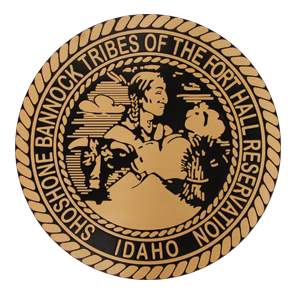A Round Table discussion between U.S. Department of Treasury officials took place in Boise on July 7, attending were COLT Tribes, including the Shoshone-Bannock Tribes.
FOR IMMEDIATE RELEASE
July 15, 2025
Shoshone-Bannock Tribes participate in U.S. Department of Treasury roundtable to share Tribal priorities
By ROSELYNN YAZZIE
Office of Public Affairs
BOISE — On Monday, July 7, Shoshone-Bannock Tribes Fort Hall Business Council Chairwoman Donna Thompson, Vice Chairman Lee Juan Tendoy, and Treasurer Ladd Edmo joined fellow members of the Coalition of Large Tribes (COLT) and tribal leaders from across Indian Country for a roundtable discussion with senior officials from the U.S. Department of the Treasury.

The meeting, hosted at the Idaho State Museum, was a unique opportunity for Tribal Nations to engage directly with Treasury Deputy Secretary Michael Faulkender and Treasurer Brandon Beach to discuss key economic priorities and tax matters. Originally, Secretary Bessent had planned to attend, but was unexpectedly called into a Cabinet meeting. Despite his absence, the meeting productive and well-received.
The session included COLT leaders Chairman J. Garret Renville (Sisseton-Wahpeton Oyate), Speaker Crystalyne Curley (Navajo Nation), and Councilman Michael Comes at Night (Blackfeet Nation), Mashantucket Pequot Tribal Nation Chairman Rodney Butler, Chairman Charles Martin (Morongo Band of Mission Indians), and others who each shared insights on pressing issues affecting their communities.

Tribal leaders focused on the following topics:
Protecting Tribal Revenue and Self-Governance by emphasizing that income generated on tribal lands should remain with the Tribes to support essential programs like law enforcement, healthcare, and community development, free from unfair federal taxation.
They advocated for Fair Tax Treatment and pushed for the finalization of the General Welfare Exclusion (GWE) rules, which impact how tribal distributions and benefits are taxed. They shared concerns about how current policies may jeopardize access to Medicaid and other safety net programs.
In regard to strengthening economic opportunities, the Tribes expressed they’re committed to growing local enterprises, creating jobs, and exploring new sectors, including retail expansion, gaming, small business development, and land-based energy projects.
Chairwoman Thompson emphasized the importance of programs like the Native American CDFI Assistance (NACA) Program, which supports tribal housing, small business loans, and financial education. She encouraged continued and protected funding to ensure long-term tribal economic stability.

Discussion also included Executive Order 14247, which directs federal agencies to phase out paper checks by September 30, 2025. Deputy Secretary Faulkender confirmed he received COLT’s comment letter and committed to working toward a solution that meets the unique needs of tribal members and communities.
Deputy Secretary Faulkender also shared that updated rules for the General Welfare Exclusion and taxation of tribal business entities should be finalized by the end of the year.
As a gesture of appreciation, the tribal leaders presented Treasury officials with gifts for the meeting and their work on behalf of advocating for Native people.

Councilman Comes at Night expressed he would like to see more working together to make things happen and thanked the Treasury officials for the visit.
“This gathering was not only productive, but it was also a reminder of the power of Tribal unity and direct advocacy,” said Chairwoman Thompson. “We thank the Treasury for listening to our concerns and for recognizing the importance of Tribal sovereignty, community priorities, and culturally grounded policymaking.”
This event demonstrates the Fort Hall Business Council’s commitment to working with federal partners to support the well-being of the Shoshone-Bannock people and ensure a strong economic future for the Fort Hall Reservation.

